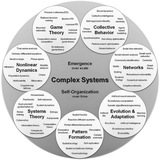The difference between #reversible and #irreversible events has particular explanatory value in #complex_systems (such as living organisms, or ecosystems). According to the biologists Humberto Maturana and Francisco Varela, living organisms are characterized by autopoiesis, which enables their continued existence. More primitive forms of self-organizing systems have been described by the physicist and chemist Ilya Prigogine. In the context of complex systems, events which lead to the end of certain #self-organising processes, like death, extinction of a species or the collapse of a meteorological system can be considered as irreversible. Even if a clone with the same organizational principle (e.g. identical DNA-structure) could be developed, this would not mean that the former distinct system comes back into being. Events to which the self-organizing capacities of organisms, species or other complex systems can adapt, like minor injuries or changes in the physical environment are reversible. However, #adaptation depends on import of negentropy into the organism, thereby increasing irreversible processes in its environment. Ecological principles, like those of sustainability and the precautionary principle can be defined with reference to the concept of reversibility.
https://en.wikipedia.org/wiki/Irreversible_process#Complex_systems
https://en.wikipedia.org/wiki/Irreversible_process#Complex_systems
